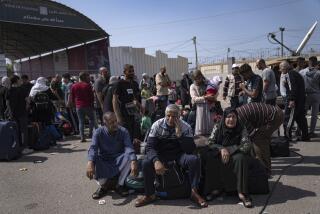Deadlock Risks Disillusion, U.S Warns Iraqis
Increasingly worried about the failure of elected Iraqi representatives to form a new government, the Bush administration is warning that the political gridlock in Baghdad is threatening the country’s progress toward democracy and encouraging insurgents to continue their attacks.
Even as U.S. officials publicly praise Iraq’s Jan. 30 election as a model of Middle East reform, they have begun privately advising leaders in Baghdad that the delay in selecting officials for a new government has caused Iraqis to lose confidence in the legislators they elected, a senior Bush administration official said.
Although U.S. officials have vowed not to interfere in the formation of the new government, they are quietly prodding the Iraqis to break their deadlock in the next few days, the official said in an interview.
“The Iraqi people themselves are starting to lose confidence, first in the people they elected, then also perhaps in the democratic process,” said the U.S. official, who spoke on condition of anonymity. “They’re asking, ‘Why did we risk our lives in those elections?’ And the perception is that [Iraqi officials] are fighting over the spoils. And we don’t want the Iraqis to become disillusioned.”
The dilemma underscores concerns outside the Bush administration that, even after the apparent success of the election, differences among ethnic and religious groups could prevent a political accord and worsen civil strife.
The 275-member National Assembly has been unable to muster the two-thirds majority needed to install top officials for an interim government. The assembly also is empowered to write a new constitution by August.
On Wednesday, the second meeting of the assembly devolved into a shouting match. The group went into secret session, then adjourned without progress.
The event was a spectacle, the U.S. official said.
“And I think it embarrassed them too. We’re saying, ‘Guys, you’ve had two months. It’s time.’ ”
The assembly is due to meet again today.
The Iraqis’ legal blueprint, called the Temporary Administrative Law, allows the interim government to take an additional six months to meet its deadline if it chooses. But Americans are urging Iraqis not to avail themselves of that option, the administration official said.
Further delay would be a “big mistake because it would stretch out the political process and encourage the insurgents to try to derail it,” he said. “We think it’s very important to retain the momentum from the election.”
A delay also could mean postponing the withdrawal of U.S. troops from the country if it required Americans to provide security for a longer period, he said.
U.S. officials argue that the election gave Iraqis confidence in the direction of the government and prompted a change of heart among some who at least indirectly supported the insurgency. The Americans point out that the number of insurgent attacks has declined since the election to the lowest level since March of last year.
The Bush administration has rarely criticized Iraqi officials. Instead it regularly praises their efforts as a prime example of the movement toward democratic reform in the Middle East, a region long dominated by authoritarian governments.
On Wednesday, Bush declared in a White House Rose Garden appearance that “the free people of Iraq are now doing what Saddam Hussein never could: making Iraq a positive example for the entire Middle East.”
Bush promised that the Iraqi legislators’ differences “will be resolved through debate and persuasion instead of force and intimidation.”
But in the gentlest of terms, he suggested that the United States was watching intently for signs of progress.
“We expect that a new government will be chosen soon and that the assembly will vote to confirm it.”
Some experts said the delay in forming a new government had confounded White House expectations that the Iraqi election would resolve differences and help stabilize the country.
“It’s not surprising that they’re losing patience,” said Steven A. Cook, a Middle East specialist with the Council on Foreign Relations. “So many big issues still have to be decided.”
Some delays stem from the structure of political power in the new government. The second- and third-largest blocs in the legislature -- Kurds and allies of interim Prime Minister Iyad Allawi -- have more leverage now than they will later in the formation of the government. That’s because a rule requiring two-thirds approval of major actions gives smaller blocs more leverage than they will have when decisions can be made with a majority vote, U.S. officials point out.
The Kurdish minority wants a large degree of autonomy for its stronghold in northern Iraq after years of oppression under Saddam Hussein, followed by de facto autonomy since the 1991 Persian Gulf War. It is trying to use its leverage to guarantee those rights as well as control of the city of Kirkuk and of the oil from fields in the north.
But Iraq’s Shiite Muslim majority, which also suffered during Hussein’s reign and came out on top in the January balloting, is wary of giving too much away.
Both aggrieved groups must also help decide the eventual political role of the nation’s Sunni Muslims, who held sway under Hussein. That group, which makes up about 20% of the population, largely boycotted the election and is seen as the leading force in the insurgency.
Despite U.S. anxiety about the political deadlock, administration officials continue to assert that the wrangling is what Iraq needs.
The new parties had no experience with compromise during the decades under Hussein and will need some if the permanent government to be elected at the end of the year is to function well, they say.
Hopes for an end to the political impasse suffered another setback Thursday when the latest Sunni nominee for speaker of parliament, Mishaan Juburi, was rejected by the dominant United Iraqi Alliance, the Shiite bloc that won 51% of the vote in January.
More to Read
Start your day right
Sign up for Essential California for news, features and recommendations from the L.A. Times and beyond in your inbox six days a week.
You may occasionally receive promotional content from the Los Angeles Times.







